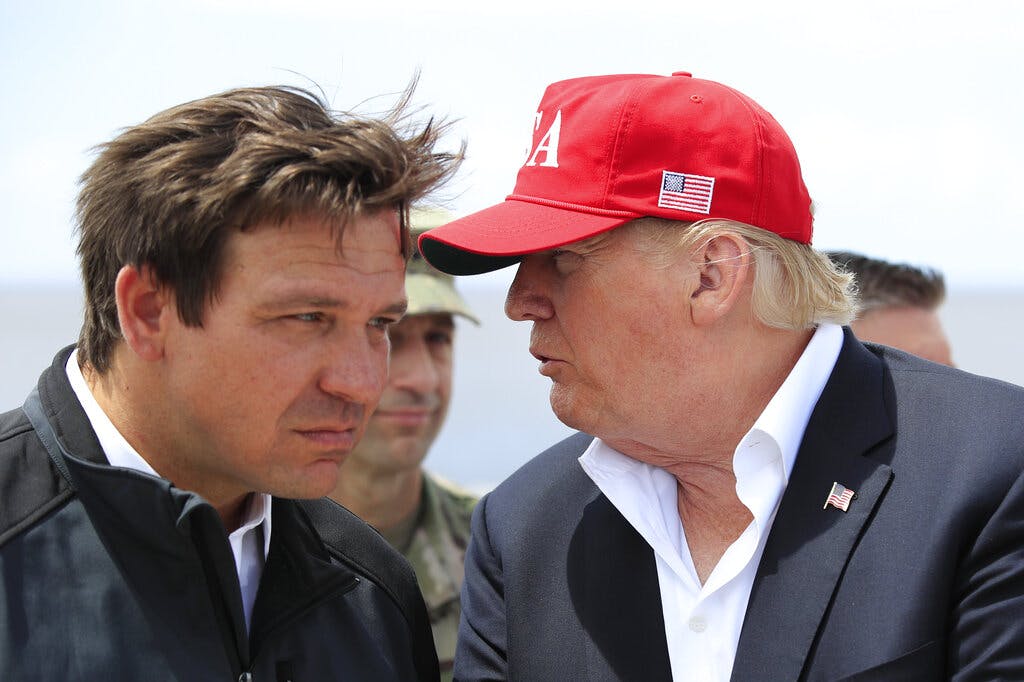The Plot Thickens: Any Indictment of Trump in Georgia Could Open an Extradition Battle Worthy of Shakespeare
Would DeSantis side with or against the Republican who poses the biggest obstacle to his own nomination for president in 2024?

Shakespeare might have come up with some poignant plots, but it would have been difficult for even the Bard to come up with a situation quite as juicy as that which could — if Georgia indicts President Trump — erupt in Florida.
That’s because of the question of extradition. A grand jury forewoman in Georgia hints that a grand jury has recommended Mr. Trump be charged. If Georgia does charge him, it would logically ask Florida to deliver the former president.
That might seem like a routine step. Florida extradition law, after all, assigns to the governor the “duty to have arrested and delivered up to the executive authority of any other state of the United States any person charged in that state with treason, felony, or other crime, who has fled from justice and is found in this state.”
As Hamlet would say, though, there’s a rub: The same statute that provides for extradition also provides that the governor “may call upon the Department of Legal Affairs or any prosecuting officer in this state to investigate or assist in investigating” a demand for extradition.
Meaning that Governor DeSantis could assign advisers to report to him regarding “the situation and circumstances of the person so demanded, and whether the person ought to be surrendered.” This part of the law suggests that the governor retains a measure of discretion.
Here’s where Shakespeare comes in, with his tales of revenge and betrayal. Mr. DeSantis could, if Mr. Trump is indicted, hold in his hands the fate of his arch-competitor for the Republican nomination for president in 2024. Would he seek to shield him, or would he wield a legal shiv and ship him to Fulton County?
On the one hand, Florida law provides that the state’s chief executive surrender, on demand of the executive authority of any other state, any person who acts to commit “a crime in the state whose executive authority is making the demand.” With proper paperwork in place, Mr. DeSantis could wash his hands of Mr. Trump.
Such a request from Georgia is inching closer. It’s possible a Georgia grand jury will hand up a bill asserting that Mr. Trump’s calls from Washington, D.C., to Georgia’s secretary of state, Brad Raffensperger, to “find him” the votes needed to win the 2020 election would be the predicate act for such a crime. News from a special grand jury indicates that it recommended charging a number of persons.
On the other hand, Mr. DeSantis might conclude that Mr. Trump lacked criminal intent — there were, after all, several persons on the call, which was not a secret. So the Florida governor could tell Georgia he’s not approving the extradition, or he could delay it with slow-moving consultations.
Extradition was known to the Framers. Article IV of the Constitution ordains that a “person charged in any state with treason, felony, or other crime, who shall flee from justice, and be found in another state, shall on demand of the executive authority of the state from which he fled, be delivered up, to be removed to the state having jurisdiction of the crime.”
The Extradition Act, from 1793, provides that “whenever the executive authority of any State or Territory demands any person as a fugitive from justice,” the “executive authority of the State, District, or Territory to which such person has fled shall cause him to be arrested and secured.” The statue lays out the extradition playbook that has been in place for more than two centuries.
The Supreme Court has weighed in on extradition, ruling in 1998 that “in case after case we have held that claims relating to what actually happened in the demanding State” must “be tried in the courts of that State, and not in those of the asylum State.” This suggests that Georgia would enjoy a strong hand when it comes to reeling in Mr. Trump.
In Puerto Rico v. Branstad, from 1987, Justice Thurgood Marshall overruled a Civil War-era holding from Chief Justice Taney that barred the federal government from enforcing a Kentucky extradition request connected to an escaped slave. Marshall wrote that Taney’s earlier decision was the “product of another time” that “may stand no longer.” This means that Georgia can appeal to Washington for enforcement.
The New Yorker’s Jane Mayer speculated in March 2021 that among Mr. Trump’s “social circle in Palm Beach, speculation abounds that Florida’s Republican governor, Ron DeSantis, an ally, might not honor an extradition request.” She did not, but could have, mentioned Prince Hal’s onetime fealty to Sir John Falstaff.
The political calculus now, though, could look different, with the political rivalry between Messrs. Trump and DeSantis coming into sharp focus and a period of detente coming to an end, with Mr. DeSantis concluding that, as the Bard put it, “The evil that men do lives after them; The good is oft interred with their bones.”

